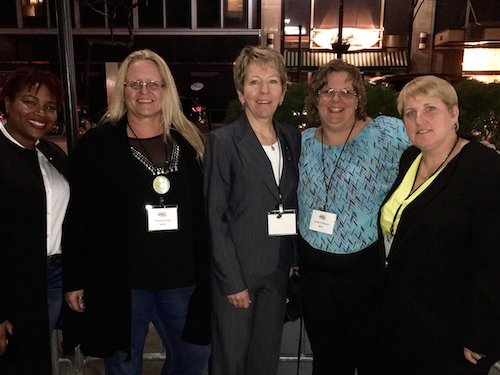Talking about women’s issues from a global perspective is a tall, sprawling order. To do it in a meaningful way isn’t easy. But for the IBEW sisters who attended the Women’s Global Leadership Program in March, they left inspired and enlightened.
“I feel forever changed,” said International Representative Rachel Bryan. “I was deeply affected by this one.”

|
| IBEW sisters stood in solidarity with women abroad at the AFL-CIO’s Women’s Global Leadership Program. Pictured: Rachel Bryan, left, international representative with IBEW’s Civic and Community Engagement Department; Theresa King, President of the Florida Building and Construction Trades and member of Tampa, Fla., Local 915; Sherilyn Wright, executive assistant to the International President; Cindy O’Meara, president of Cedar Rapids, Iowa, Local 1362; and Erin Sullivan, steward for New York Local 3.
|
Each year, the United Nations Commission on the Status of Women, a global policy-making body focused on gender equality, holds meetings to address a range of issues. This year, the focus was on economic empowerment and the AFL-CIO convened a four-day conference in New York to coincide with the U.N. meetings. Fifty people were accepted. Five were from the IBEW.
“It was a great opportunity to meet women from all over the world who are working on labor issues,” said Sherilyn Wright, executive assistant to International President Lonnie R. Stephenson. “There is a lot that we can learn from each other.”
The agenda included workshops and panels on the global economy and organizing, and meetings of the U.N. Commission.
“It opened my eyes to the global picture,” said Erin Sullivan, a steward with New York Local 3 and chairwoman of the Third District’s Women’s Committee. She also wrote about the program for her local.
Attendees learned about the global supply chain and how actions in the U.S. impact working people across oceans.
“Everything has a price. Walmart says ‘save more, live better.’ Well, we pay less but it’s on the backs of others,” Sullivan said. “Somebody is getting exploited in the supply chain.”
“Women workers across borders share common struggles and it is critical that we band together to push for a fair and inclusive economy,” said AFL-CIO Secretary-Treasurer Liz Shuler, who spoke at the conference. Shuler is also a member of Portland, Ore., Local 125.
A new AFL-CIO report, “Transforming Women’s Work: Policies for an Inclusive Economic Agenda,” explored the link between growing income inequality and declining unionization and noted that the benefits of membership are often greater for women. For instance, in Canada, trade union women earn close to $7 more than their nonunion counterparts.
It also noted how fields that are over-represented by women are “feminized,” and is isn’t until these jobs are “defeminized” with more men that wages go up. Relatedly, women are underrepresented in the industrial sector which tends to pay higher wages.
“As a union electrician with a good salary and benefits, I didn’t realize how undervalued women’s work is,” Bryan said.
“Prior to this conference, I had not visualized the impact of the global economy on women,” said Florida Building and Construction Trades President Theresa King. “Other than general knowledge from my trades training, I really only knew about my own country’s economics.” King is also a member of Tampa, Fla., Local 915.
The attendees also discussed IBEW’s role in promoting women in the trades.
“We have to take out the ‘she’ and ‘he’ and replace it with ‘we.’ Women’s issues are everyone’s issues,” Sullivan said.
“Men and women need to band together and fight back against stereotypes about what constitutes men’s and women’s work,” Shuler said.
“It’s going to take brothers advocating for sisters,” Bryan said.
“The IBEW has moved beyond a lot of other trades in recognizing that women bring a lot to the advancement of our industry,” King said. “I am a proud IBEW construction electrician and would not have been able to excel as far as I have without the support and encouragement from my brothers and sisters.”